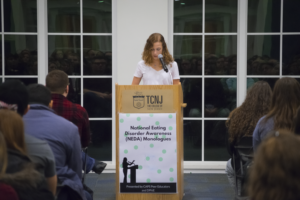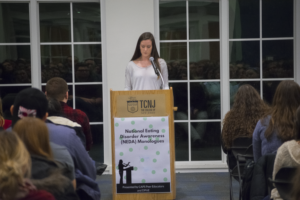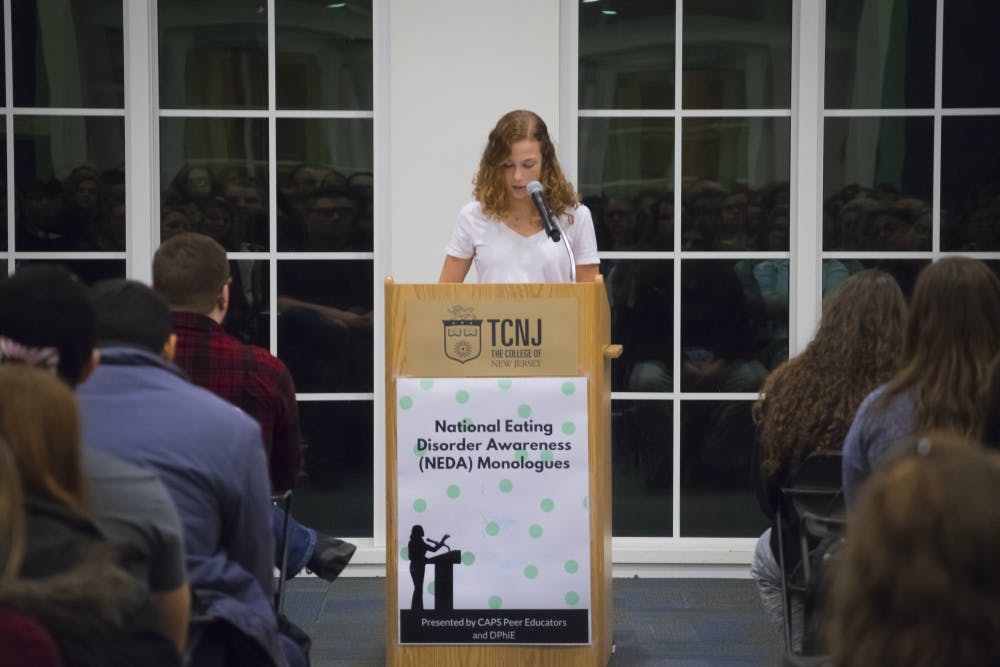By Jessica Ganga
Staff Writer
“Imagine loving food and fearing food. Imagine fearing your favorite food.”
This is the reality that Fabriana Andriella, a sophomore deaf education and psychology double major, faced when she had an eating disorder.
“I’ll admit I’ve had a complicated relationship with food, and I’ve suffered many years from poor body image,” she said.
Eight students shared how they struggled to overcome their eating disorders on Monday, Feb. 27, at the National Eating Disorder Awareness Monologues hosted by Counseling and Psychological Services Peer Educators and Delta Phi Epsilon.
No two monologues were the same, but each shared similar themes including losing friends, struggling to have a normal lifestyle and fighting to take back the control the disease had over them.
“At the time, I liked the control I had over myself,” said Olivia Gorski, a sophomore health and exercise science major. “I admired myself for being able to adhere to the strict eating patterns I had developed. Looking back now, I can see how distorted my thought processes were back then. The things that I was doing actually seemed normal.”

According to Gorski, her eating disorder developed from positive parts of her life like her love for eating healthy and running. But those spiraled into negatives, causing her to miss out on other aspects of her life that could break her newfound eating patterns.
“I usually found myself avoiding going out to dinner with my friends or barbecues in the summer because it was just easier for me not to put myself in the position where I’d have to eat unhealthy or possibly go over my calorie limit,” she said.
Andriella said that in her case, even if she was happy with how she looked, the disorder was always there.
“Control. It’s all about control. Even when I’m comfortable in my skin, I know it’s because of control,” Andriella said.
Though difficult, the women talked about how they slowly took charge of their lives.
Maya Beal, a freshman communication studies major, did what most people with an eating disorder do: She focused solely on calories. Now, her focus is on schoolwork and being comfortable with what she is eating.
“The control is now aimed at bringing my feet back to the ground when I get carried away and not keeping myself afloat on really nothing but self-destruction,” Beal said.
Sophomore marketing major Kerry Silverman personified her eating disorder and named it “Ed,” a common strategy for those with eating disorders, as the voice inside their head becomes a separate entity that they tackle.
“I wasn’t living for Kerry anymore. I was living for Ed,” she said.
Silverman ended up in the hospital because she developed a heart condition. Now, Silverman shares her success story as she is in recovery, something she said wouldn’t have been possible without people by her side.
“An illness like anorexia is something that can’t be fought alone, and luckily, I had an army fighting alongside me,” she said.
For others, the support they received helped them accept and love themselves.
“Having that constant love and care and support has activated my self-love and self-acceptance,” Andriella said.
Senior psychology major Lauren Plawker didn’t just use her support system to help on a journey toward recovery, but rather the monologues themselves. Plawker had already spoken in two NEDA monologues prior to this one.
“Speaking at the monologues was one of the most cathartic things I had ever done,” she said about her first NEDA monologue.

She shared with the audience that it was during her first monologue that she first spoke the words “I have an eating disorder” to people who weren’t a part of her recovery process.
Now, she uses the monologues to inspire others.
The following year, a girl approached Plawker and said she was the reason that she had sought treatment for her eating disorder.
“It was the most incredible and heartbreaking thing that had ever happened to me,” Plawker said.
During Silverman’s recovery, she published a series of articles, which she shared on her Facebook wall. Eventually, people reached out to her for advice. Like Plawker, she chose to speak at the monologues to reach out to others.
“I’m here sharing my story today so no one has to be alone as I once was,” Silverman said.
Plawker labeled eating disorders as an addiction with some good or bad days, and some not so easily defined. According to Plawker, recovery from an eating disorder is not a day-to-day process, but rather a second-to-second process in order to keep from relapsing.
Today, Plawker is making the choice to live her life, something she said she finally understands.
“I didn’t get to choose my addiction, but I eventually got to choose to fight back against it,” Plawker said. “I actively make choices to allow me to keep thriving.”
As the monologues came to a close, the speakers offered messages of hope for those who are battling an eating disorder. For Silverman, she gained strength.
“It’s one of the hardest things I’ll ever endure, but I’m stronger because of it,” Silverman said. “Life is beautiful, and I am finally able to realize that.”
Gorski assured the audience that there is a chance to get better, and recovery is possible for everyone.
“Recovery is possible, and there’s always hope. It’s not going to be easy,” Gorski said. “It’s not going to happen overnight, and there’s going to be plenty of bumps in the road. But it’s possible, and everyone is capable of it, and everyone’s worth it.”







